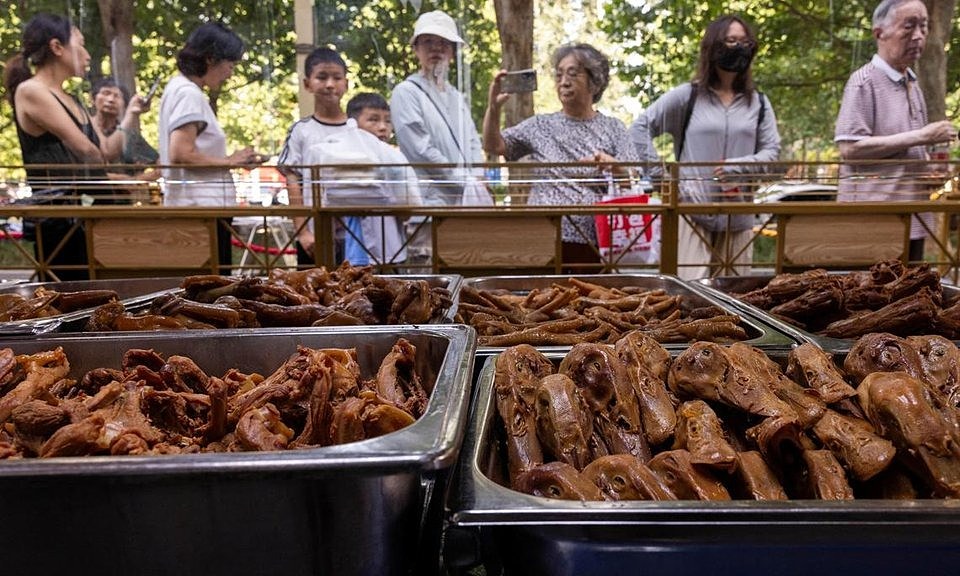
High-End Hotels Turn to Street Food as China Grapples with Economic Slowdown
Facing dwindling revenues due to weakened consumer spending and tightened corporate budgets, luxury hotels in China are taking an unconventional approach: setting up street food stalls. This shift reflects a broader economic trend as China navigates potential deflationary pressures.
In Beijing, the Beiyuan Grand Hotel is among a growing number of establishments that have begun hawking gourmet dishes outdoors each evening. Xu Anwen, the hotel's sales director, explains that traditional strategies like discounts are no longer effective in attracting customers. The hotel's outdoor stall features its signature crispy roast pigeon, priced lower than on the indoor menu, and has seen considerable success. Sales have risen from approximately 80 pigeons a day to around 130 since the stall's opening in late July.
This move follows a significant decline in indoor dining. The use of private dining rooms at the Beiyuan Grand Hotel has plummeted, and the average per-person spend has halved. While the outdoor stall operates with a reasonable profit margin, it isn't enough to fully compensate for the losses incurred indoors.
Beiyuan is not alone. At least 15 high-end hotels across China have adopted this strategy. These hotels have been impacted by weakened consumer demand, reduced travel budgets for corporations and government entities, and a decrease in banquet reservations. Furthermore, Beijing's reinforced austerity measures for public sector workers, including restrictions on dining out and alcohol consumption, have further impacted business.
The Grand Metropark Hotel in Beijing also began selling street food in July. According to staff member Wei Zheng, this initiative has added several thousand yuan to the hotel's daily revenue through the sale of dishes like braised duck, fish stew, and crayfish.
Deflationary Pressures and Economic Realities
Economists view this trend as a symptom of deeper economic challenges facing China. Dr. Shi He Ling, an economics professor at Monash University, suggests that the actions of these hotels reflect a "fairly significant risk of deflation" in China's overall economy. Stagnant consumer prices and other indicators, like discounted breakfasts and supermarket flash sales, also point to deflationary pressures.
Official statistics reflect the economic strain. Catering revenue growth slowed significantly in June, and accommodation industry profits in Beijing experienced a sharp decline in the first half of 2025.
Consumer Behavior and the Pursuit of Value
Yaling Jiang, founder of ApertureChina, a research consultancy, notes that consumers are actively seeking value and novelty during the economic downturn but remain hesitant to spend on high-end experiences. Shoppers like Seven Chen, who works in finance, acknowledge the challenges faced by hotels and admit to reducing their own stays in upscale establishments due to income constraints.
Adaptability and Survival
Other hotels, including the JW Marriott in Chongqing and the Hilton Wuhan Riverside in Wuhan, have also reportedly embraced the street food approach. The River & Holiday Hotel in Chongqing reported a substantial increase in daily revenue after setting up food stalls in its parking lot.
Shen Qiuya, the marketing and sales manager at the River & Holiday Hotel, addressed criticisms about the potential damage to the hotel's brand image, stating that "survival is the most important thing. Face isn't worth anything." This sentiment underscores the urgency and pragmatism driving these strategic shifts within the hospitality industry.
The willingness of these high-end establishments to adapt and embrace unconventional strategies highlights the challenges and changing landscape of China's economy. As businesses navigate these uncertain times, innovation and a focus on meeting consumer demands for value are proving essential for survival.


No comments:
Post a Comment